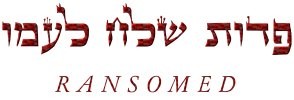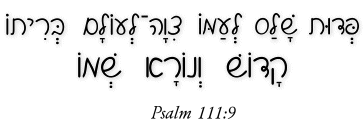|
|
|||||||||||||||||||||
 |
|||||||||||||||||||||
|
Learn Hebrew |
|||||||||||||||||||||
|
Irony and Redemption |
||||||||||
|
Pedut Shelach Le'ammo |
||||||||||
 |
||||||||||
|
He sent redemption to his people; he has commanded his covenant forever. |
||||||||||
|
Psalm 111:9 |
||||||||||
|
WHEN MOSES CAME with the message, "Let my people go," he told Pharaoh that the LORD made a distinction (pedut) between Israel and the other nations (Ex. 8:23). When the first Passover was instituted, this distinction was expressed as the "ransom price" of the death of the firstborn of Egypt, both man and beast (Ex. 4:23; 12:29, Isa. 43:3). Consequently the Exodus was to be commemorated by the Jewish people through the consecration of the firstborn: All firstborn sons of Israel were called to be God's priests, responsible for offering sacrifices on behalf of their families (Ex. 13:2,12). |
|
|
|
fulfilled at the end of His life when He was executed by their counsel: |
|
|
|
The irony is that those who were appointed as His priests were the very ones who unwittingly made Jesus their Redeemer! (This greater redemption is called pedut olam – everlasting redemption – in Hebrews 9:12). Pedut shalach le'ammo: God has indeed sent a ransom for His people in the sacrifice of His Son Jesus - holy and awesome is his name! |
|
Transliteration: |
|||||||||||||||
 |
|||||||||||||||
|
Pedut shalach le'ammo tzivah-le'olam b'rito kadosh v'nora sh'mo. |
|||||||||||||||
 |
|||||||||||||||
|
Hebrew for Christians |
|||||||||||||||
|
|||||||||||||||

